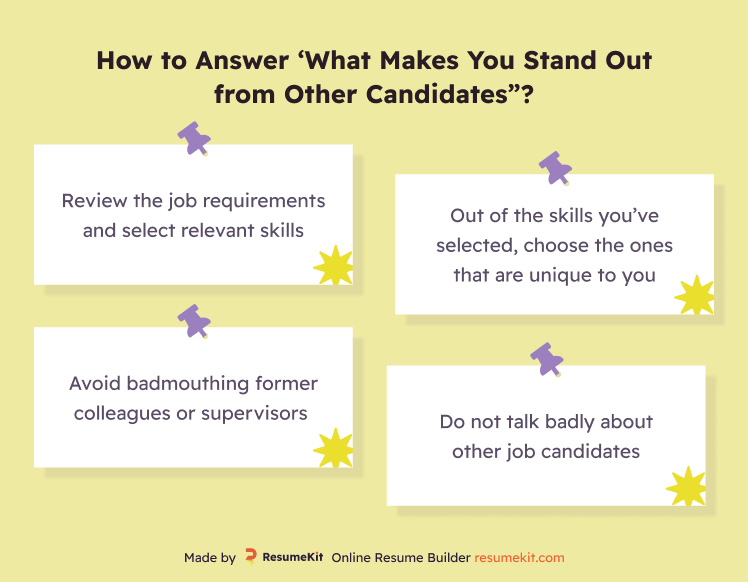Would you be thrown off balance if asked the notorious “What makes you stand out from other candidates?” question in a job interview? A lot of candidates report that they were, which is why we decided to give you some tips to help answer this question.
When you prepare a good answer to this question ahead of time, it can actually help you present yourself in the best of lights and improve your chances of getting the job.
We keep going over job interview questions and answers in our guides prepared in consultations with international HR experts, and this article will focus on a common question you may expect to be asked in almost every interview you are invited for.

Table of Contents
What’s the purpose of this question?
When you set out to prepare an answer to this question, start by thinking of why the hiring manager may want to ask it in the first place. What do they want to hear from you when they ask what makes you different from other candidates?
You see, sometimes, applicants start telling long stories about their previous jobs, reciting what they have already said in their resumes, and the interviewer may have a hard time singling out the details that would tell them whether you have the skills or experience that’s required for the position. This question is meant to have you tell the potential employer about your professional strengths, the experience that’s relevant to this particular job and the unique personal qualities you might have.
What they don’t want to hear from you is a canned answer built on a template you found on the web or simply based on the requirements listed in the job ad. Instead, try to make your answer unique, and here are some tips that can help you do that.

How to answer the “What makes you stand out from other candidates?” question
The most important tip we could give you is to focus on what actually makes you special and how that will help you in the new role. Follow the advice below to nail it:
- Review the job requirements and try to determine which of your skills and personal qualities would be most relevant. Make a list so you can refer to it when preparing your answer or when spontaneously answering this question during the interview.
- As much as you might be tempted to list all of your skills and experience, this can be a big mistake. It is best to focus on the most relevant historic info.
- Out of the relevant skills and experience you included on your list, choose the ones that are really unique and support them with examples. Were you able to solve a problem nobody else could find a solution to? Did you reach a certain goal in a fraction of the time planned for it?
- Give your answers with confidence, but be sure to avoid downplaying the contribution of other people on your team, or worse – bad-mouthing your former colleagues or superiors. You want to prove your unique talent, but not at the cost of others. And don’t talk bad of other candidates either.
Answer Examples to “What makes you stand out from other candidates?”
Want to see some real-life examples of how this question may be answered? Here are a few to give you inspiration:
#1 Unique skills that will help you in your new role
This is how a candidate for a copywriter position at a software company was able to nail this question by sharing their knowledge of programming languages:
My extensive experience as a translator and copywriter, and my near-native knowledge of English and French make me a good fit for the position, but what can make me really stand out is my training and experience in programming, which I had early in my career. Working with GUI copy and other software-related texts may be a bit hard for someone with little tech knowledge. I know how to read editable text and how not to mess up text strings in localization files, how to keep it short for limited interface space and a lot of other things that will help me work faster and avoid errors.
#2 Experience to impress the employer
If you have some experience that is not listed as a requirement, but can help you perform your duties better than other people would, you can share it with the HR like this candidate for a personal assistant position did in their response:
Making travel arrangements is on the list of responsibilities for this job, and I believe that my experience as a travel agent can help me book the most convenient routes, hotels and airline tickets. I worked in a travel agency that sold international vacation packages and airline tickets, as well as booked business trips for corporate clients, so I am familiar with the process from the inside.
#3 Rare talent you can use
Some talents can be quite rare, and the HR will see what a gem you are when you share your special talent with them. Just like this applicant for an email tech support agent position did:
I know that your company works with customers from all over the world, and that some of them may not speak English. Learning foreign languages has been my hobby since high school. I believe that my knowledge of 4 additional languages can help me provide better service to customers who speak them. English and Portuguese are both my native languages, as I spoke both growing up. I can also speak Spanish, French and German quite fluently, and am currently learning Japanese. When a tech support agent speaks the customer’s language, it helps them connect on a more personal level, and helps keep the customer happy. And I believe this can help with customer retention, reduce refund rates and help me solve the users’ problems more effectively.
To be able to get to the interview stage, you have to know what skills to put on resume, how to write an effective cover letter (see this article with cover letter examples), and the best websites to look for suitable job openings on.